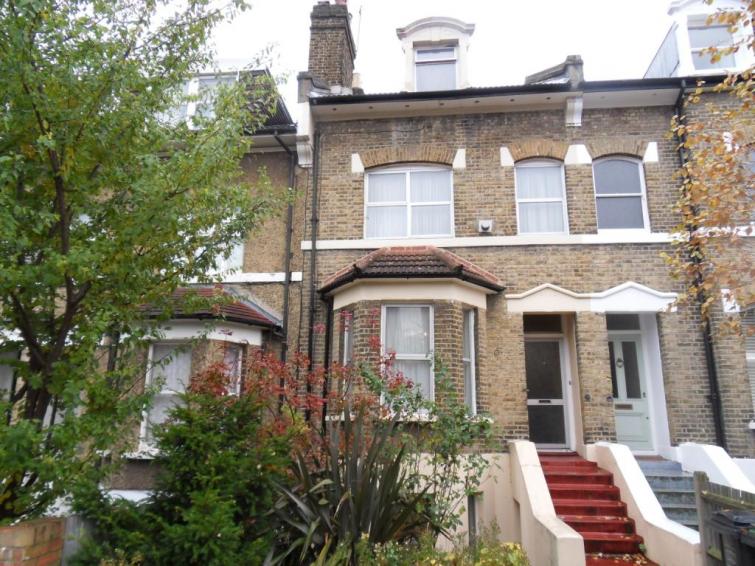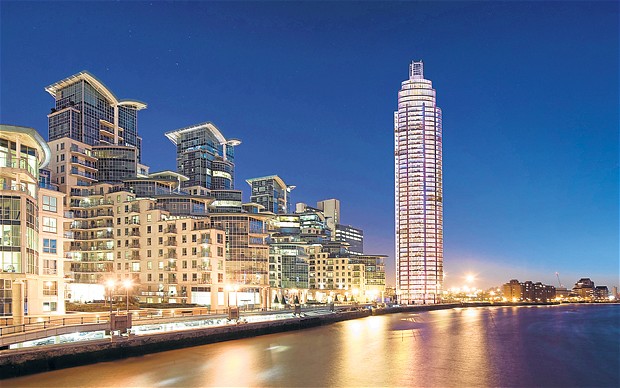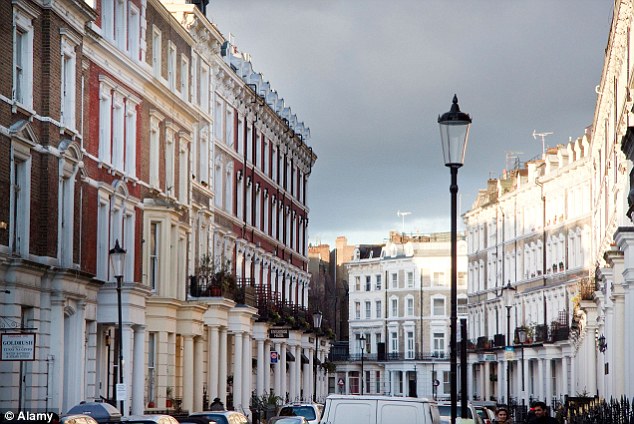467: Can Property Prices Rise During Stagnation?
04-20-2013

PropertyInvesting.net team
Economic Distress: There has been two years of mild austerity measures and money printing that has failed to kick-start the UK economy. Manufacturing is still in a constant depression, North Sea oil and gas production has crash 30% in the last two years and the deficit is still a frightening 7% of GDP. Our view cynical as it may sound, is that the only way sound is that the only way for the Coalition to win the next election is to manufacture a mini-house price boom. But this is not normally possible in times of stagnation or mild recession how can this happen?
Propping Up Property Market: The Bank of England know how important the property market is to the economy. The last thing they need or want is a house price crash. There is simply too much equi ty or net worth tied up in property wealthy. To see this destroyed would create huge deflationary pressures. Their central thesis is a healthy economy should have inflation at around 2% and wage earnings growth. They are really stuck between a rock and a hard place. The UK private sector debt is about 200% of GDP and public sector debt runs at about 100%. The country has far too much debt. But they have the option of printing more money to debased the currency and monetise the debt. This tends to increase prices and make the poorer and lower middle class feel far worse off. But this is what they have done and will continue to do.
ty or net worth tied up in property wealthy. To see this destroyed would create huge deflationary pressures. Their central thesis is a healthy economy should have inflation at around 2% and wage earnings growth. They are really stuck between a rock and a hard place. The UK private sector debt is about 200% of GDP and public sector debt runs at about 100%. The country has far too much debt. But they have the option of printing more money to debased the currency and monetise the debt. This tends to increase prices and make the poorer and lower middle class feel far worse off. But this is what they have done and will continue to do.
Inflation then Growth Manipulation: But there is something that they dont advertise weve been analysing and we think you should know about. Its all to do with how they calculate the inflation and GDP numbers. Central Bankers, Bankers and Politician all like to see low inflation and high growth numbers. But the government manipulate or work the inflation numbers to look far less than they actually are. Essentials like rent, fuel, food, transport and basis tax and services costs are all rising at 5-10% or more a year. But inflation stays stubbornly low how can this be? Well the basket that measure inflation is changes, quantities get smaller, substitution occurs (red meat prices rise, so they say people switch to chicken then use this as the measure), and the price of some items like iPADs drops tempering inflation numbers. The value of new technology features in cars are subtracted from the price. Lots of games are played. Fuel and rent are not accounted for as a proportion like they should be for someone living in SE England. You just cannot trust the inflation numbers. So the government claim there has been growth of 0.5% in the last year, with inflation of 2.5%. But instead inflation has been more like 5.5% so therefore growth has been -2.5% - or a recession on contraction of 2.5% in the size of the economy. Ever since the financial crisis of 2008, we have been in recession a long contraction of about -2 to -3% a year for the last four years added to the -7% contraction in the 18 months around 2008. People in the north, Wales, far SW of England and northern Midlands will relate to this. Things have been closing, unemployment has risen, house prices have stay subdued or dropped and the economy has struggled. Its only been London, and some parts of Manchester and small prosperous University Cities that have seen any real growth. But the official numbers give an illusion of bumping along the bottoms as a country when in fact London has growth and everywhere is in serious decline.
price of some items like iPADs drops tempering inflation numbers. The value of new technology features in cars are subtracted from the price. Lots of games are played. Fuel and rent are not accounted for as a proportion like they should be for someone living in SE England. You just cannot trust the inflation numbers. So the government claim there has been growth of 0.5% in the last year, with inflation of 2.5%. But instead inflation has been more like 5.5% so therefore growth has been -2.5% - or a recession on contraction of 2.5% in the size of the economy. Ever since the financial crisis of 2008, we have been in recession a long contraction of about -2 to -3% a year for the last four years added to the -7% contraction in the 18 months around 2008. People in the north, Wales, far SW of England and northern Midlands will relate to this. Things have been closing, unemployment has risen, house prices have stay subdued or dropped and the economy has struggled. Its only been London, and some parts of Manchester and small prosperous University Cities that have seen any real growth. But the official numbers give an illusion of bumping along the bottoms as a country when in fact London has growth and everywhere is in serious decline.
Property Benefits: This description of inflation is the backdrop to what we really want to talk about. Property and investment opportunities in property. Property investors love to see asset prices rise, along with yields (borrowing costs dropping and rents rising). Many are very worried that a nightmare scenario of increasing interest rates, declining property prices and declining rental prices will kick-in shortly. What we are now going to describe might give you some optimism and comfort. Its bec oming clearer to us that the scene is set for a positive back-drop for property for the next 1-2 years. Lets explain.
oming clearer to us that the scene is set for a positive back-drop for property for the next 1-2 years. Lets explain.
Low Wage Inflation: Firstly, globalisation and the inundation of foreign workers into London and the UK has kept a lid on wage inflation. These workers are willing to work for far less than the average British citizen this helps keeps a lid on wages and inflation.
Foreign Workers: The foreign works often settle in the UK and have large families this boosts the population, GDP growth and housing demand mainly rental demand but eventually demand to purchase properties. Many get into buy-to-let investing once they have saved some money. Since the increase in immigration started in 1997, the population has been expanding dramatically especially in London. Every ten years, the city increases by 10% - one can see this simply by the pressures on the transport system and sheer numbers moving around the city now compared to 15 years ago.
Money Printing: The waves of money printing £0.2 Trillion has failed to get the economy shifting. Most people in the UK simply dont want to go out shopping because they are trying to reduce their debts, dont see any reason to be positive about the economy and are worried about loosing their jobs both in the private sector which is struggling, and the public sector that is undergoing correction downwards to sustainable numbers and wage freezes for most.
shifting. Most people in the UK simply dont want to go out shopping because they are trying to reduce their debts, dont see any reason to be positive about the economy and are worried about loosing their jobs both in the private sector which is struggling, and the public sector that is undergoing correction downwards to sustainable numbers and wage freezes for most.
Miserable Winter Weather: The miserable weather in the last 6 months has hardly help encourage spending especially as fuel bills have risen so much as North Sea gas and oil declines and more gas imports are required.
Inflation Not Increasing Yet: This miserable backdrop means hyper or high inflationary pressures have not yet arisen. If anything, deflationary pressure have been more pronounced. What we have is a kind of stagflation without anyone talking about it. Real inflation of 5.5% and recession of 2.5%. In this environment, property price could crash. So its very important with the banks so reluctant to lend people money, the government creates a mechanism to keep the property market from coming off the rails.
No Cost Deposits: Well they dreamed up this idea a few weeks ago. Give tax payer (or government) guarantees for deposits of up to 20% for properties costing up to £600,000. That should certainly help the property market particularly in SE England. This will help the Tory voters in most of England. But unfortunately the law of unintended consequences to kick-in with this one. Firstly pe rversely it allows foreign national living abroad to buy second homes with deposit under-written by the UK tax payer unless we are mistaken. That should certainly help property prices, but it will also help worsen the housing crisis by potentially stripping these properties away from the rental market unless they are buy-to-let investments. The government could point to the new rule on 100% council tax on empty property as a way to discourage the behaviour and tax foreign people not living in the UK or using their homes a fair point.
rversely it allows foreign national living abroad to buy second homes with deposit under-written by the UK tax payer unless we are mistaken. That should certainly help property prices, but it will also help worsen the housing crisis by potentially stripping these properties away from the rental market unless they are buy-to-let investments. The government could point to the new rule on 100% council tax on empty property as a way to discourage the behaviour and tax foreign people not living in the UK or using their homes a fair point.
Property Boom London: Many young professional people who would have no chance of owning their own property can now buy a property for £600,000 with a 5% deposit under-written by the tax payer. Thats incredible. No wander there is so much interest. If/when this scheme gets the go ahead, it will surely create a mini-boom in property prices in SE England where most of the pent-up demand is the shortage of properties in London will intensive. But it could lead to rents stabilizing or dropping a little as these renter find new homes to purchase. Overall anyone owning many rental properties in London should do well from this new scheme. Buy to let investors in other parts of the country, particularly where many new jobs are being creates like Leeds, Manchester, Southampton and Bristol will also do well as this mini-property price boom takes hold.
Jump On Bandwagon: European workers will see this opportunity and expectation of higher prices and jump into the property market as well to ride the wave. Yes, it really will be getting more like the good old days. But it could end badly in a few years time so watch out.
Low Interest Rates: The overall economy is completely depressed so the inflation numbers being .jpg) manipulated means the Bank of England can claim very little inflation and hence justify keeping interest rates at all-time lows. They have money printing in their back pockets just in case Treasuries purchasers desert the markets. They can simply print money to buy this debt. So the Bank of England has a far degree of control over interest rates and money printing for the next few years it seems. Yes, there is always a risk of interest rates spiking, but the BoEs ability to simply add some numbers in a computer probably provides comfort to the conventional international money market investors to keep faith with the UK economy despite its problems. The ultra-low interest rates means banks get money for nothing then can lend out at 5% - a massive margin. It means mortgages stay fairly low in historic terms. Savers are destroyed. Just imagine though if interest rates shot from 0.5% to 5.5% - then mortgages from 5% to 10% - large scale collapse would occur. So the Bank of England will fight all it can by printing money to drive down rates. This will stimulate inflation and currency debasement.
manipulated means the Bank of England can claim very little inflation and hence justify keeping interest rates at all-time lows. They have money printing in their back pockets just in case Treasuries purchasers desert the markets. They can simply print money to buy this debt. So the Bank of England has a far degree of control over interest rates and money printing for the next few years it seems. Yes, there is always a risk of interest rates spiking, but the BoEs ability to simply add some numbers in a computer probably provides comfort to the conventional international money market investors to keep faith with the UK economy despite its problems. The ultra-low interest rates means banks get money for nothing then can lend out at 5% - a massive margin. It means mortgages stay fairly low in historic terms. Savers are destroyed. Just imagine though if interest rates shot from 0.5% to 5.5% - then mortgages from 5% to 10% - large scale collapse would occur. So the Bank of England will fight all it can by printing money to drive down rates. This will stimulate inflation and currency debasement.
Gold and Property: The gold price mini-correction from $1600 to $1400/ounce probably saw some hedge funds sell their gold futures start shorts and they will likely shift this money to the relatively safe haven of West London property. At least no-one can seize property property taxation is deeply unpopular and there are no many better places to live or raise international children than in London for the super-rich (low crime, good transport, excellent schools, theatre, restaurants, cool climate, tourism and shopping and investment links).
Mini-Boom in Property: Because interest rates are so low, and funding is now easier with these new government schemes the property market in expectation has started to pick up. We think this will accelerate over the next few months firstly the spring weather will get people in the right mood. Then there is a pend up demand going back four years of younger people wanting to get onto the property ladder. Then there are waves of foreign workers who would like to do the same. There will be the perception that the worse is behind us based on the latest market talk. But really the long recession continues remember the manipulated inflation and GDP numbers.
Yes, House Prices Can Rise During A Recession: So in summary, despite the recessio n and fairly high inflation with declining living standards, we expect property prices to rise in London and areas close to London, plus cities and towns with strong private sector jobs growth. Best avoid remote rural areas with declining public sector jobs numbers, aging populations and low migration of people into the area. The strongest price growth should be in cities, historic towns, with strong private sectors and lower exposure to public sector jobs.
n and fairly high inflation with declining living standards, we expect property prices to rise in London and areas close to London, plus cities and towns with strong private sector jobs growth. Best avoid remote rural areas with declining public sector jobs numbers, aging populations and low migration of people into the area. The strongest price growth should be in cities, historic towns, with strong private sectors and lower exposure to public sector jobs.
Because rents have risen fast, and mortgage rates have dropped, its become far cheaper to buy a property then rent. Hence property prices should rise as long as massive new unemployment occurs and if mortgage lending improved as now seems likely.
London Population Boom: London has added 800,000 in the last ten years and will add a further 800,000 in the next ten years, there is almost no building occurring. The place is getting far more crowded. The rental market will stay strong. The economy should continue to expand. Property prices will be given a big boost by the next government scheme note this is open for borrowing up to £600,000 - a massive amount. So properties in London between £200,000 and £600,000 should start to shoot up int eh next few months.
Tell It As It Is: We are trying to tell it like it is rather than give any judgments about whether things are fair, amicable or correct in policy. So serious property investors can identify opportunities and move or position their portfolios accordingly. We hope this Special Reports helps. If you have any questions or comments, please contact us on enquiries@propertyinvesting.net.

